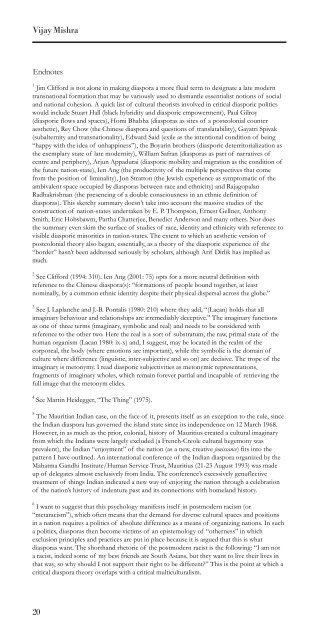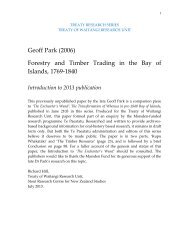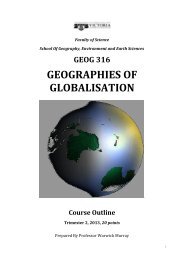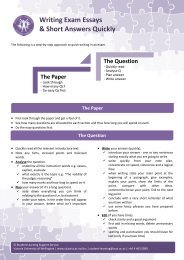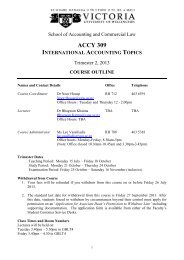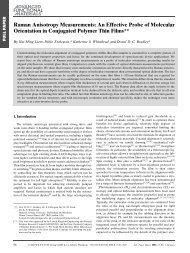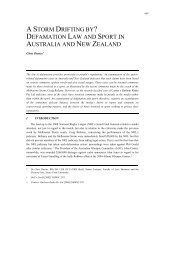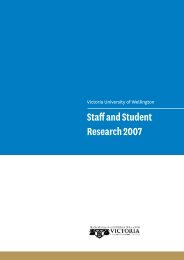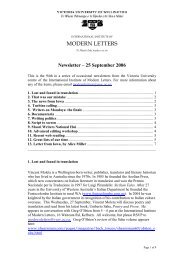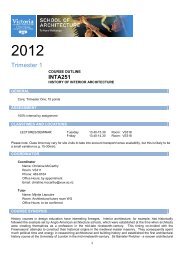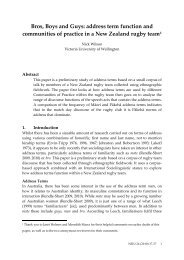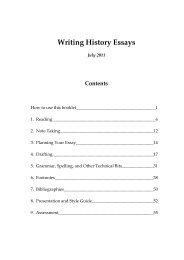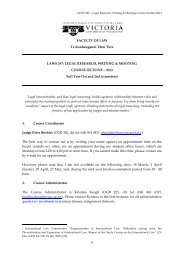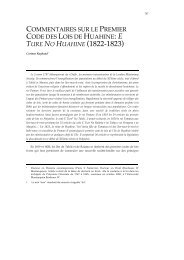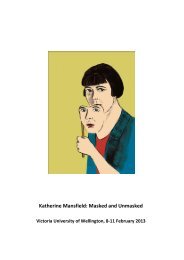The Diasporic Imaginary and the Indian Diaspora - Victoria ...
The Diasporic Imaginary and the Indian Diaspora - Victoria ...
The Diasporic Imaginary and the Indian Diaspora - Victoria ...
You also want an ePaper? Increase the reach of your titles
YUMPU automatically turns print PDFs into web optimized ePapers that Google loves.
Vijay Mishra<br />
Endnotes<br />
1 Jim Clifford is not alone in making diaspora a more fluid term to designate a late modern<br />
transnational formation that may be variously used to dismantle essentialist notions of social<br />
<strong>and</strong> national cohesion. A quick list of cultural <strong>the</strong>orists involved in critical diasporic politics<br />
would include Stuart Hall (black hybridity <strong>and</strong> diasporic empowerment), Paul Gilroy<br />
(diasporic flows <strong>and</strong> spaces), Homi Bhabha (diasporas as sites of a postcolonial counter<br />
aes<strong>the</strong>tic), Rey Chow (<strong>the</strong> Chinese diaspora <strong>and</strong> questions of translatability), Gayatri Spivak<br />
(subalternity <strong>and</strong> transnationality), Edward Said (exile as <strong>the</strong> intentional condition of being<br />
“happy with <strong>the</strong> idea of unhappiness”), <strong>the</strong> Boyarin bro<strong>the</strong>rs (diasporic deterritorialization as<br />
<strong>the</strong> exemplary state of late modernity), William Safran (diasporas as part of narratives of<br />
centre <strong>and</strong> periphery), Arjun Appadurai (diasporic mobility <strong>and</strong> migration as <strong>the</strong> condition of<br />
<strong>the</strong> future nation-state), Ien Ang (<strong>the</strong> productivity of <strong>the</strong> multiple perspectives that come<br />
from <strong>the</strong> position of liminality), Jon Stratton (<strong>the</strong> Jewish experience as symptomatic of <strong>the</strong><br />
ambivalent space occupied by diasporas between race <strong>and</strong> ethnicity) <strong>and</strong> Rajagopalan<br />
Radhakrishnan (<strong>the</strong> presencing of a double consciousness in an ethnic definition of<br />
diasporas). This sketchy summary doesn’t take into account <strong>the</strong> massive studies of <strong>the</strong><br />
construction of nation-states undertaken by E. P. Thompson, Ernest Gellner, Anthony<br />
Smith, Eric Hobsbawm, Partha Chatterjee, Benedict Anderson <strong>and</strong> many o<strong>the</strong>rs. Nor does<br />
<strong>the</strong> summary even skim <strong>the</strong> surface of studies of race, identity <strong>and</strong> ethnicity with reference to<br />
visible diasporic minorities in nation-states. <strong>The</strong> extent to which an aes<strong>the</strong>tic version of<br />
postcolonial <strong>the</strong>ory also began, essentially, as a <strong>the</strong>ory of <strong>the</strong> diasporic experience of <strong>the</strong><br />
“border” hasn’t been addressed seriously by scholars, although Arif Dirlik has implied as<br />
much.<br />
2 See Clifford (1994: 310). Ien Ang (2001: 75) opts for a more neutral definition with<br />
reference to <strong>the</strong> Chinese diaspora(s): “formations of people bound toge<strong>the</strong>r, at least<br />
nominally, by a common ethnic identity despite <strong>the</strong>ir physical dispersal across <strong>the</strong> globe.”<br />
3 See J. Laplanche <strong>and</strong> J.-B. Pontalis (1980: 210) where <strong>the</strong>y add, “(Lacan) holds that all<br />
imaginary behaviour <strong>and</strong> relationships are irremediably deceptive.” <strong>The</strong> imaginary functions<br />
as one of three terms (imaginary, symbolic <strong>and</strong> real) <strong>and</strong> needs to be considered with<br />
reference to <strong>the</strong> o<strong>the</strong>r two. Here <strong>the</strong> real is a sort of substratum, <strong>the</strong> raw, primal state of <strong>the</strong><br />
human organism (Lacan 1980: ix-x) <strong>and</strong>, I suggest, may be located in <strong>the</strong> realm of <strong>the</strong><br />
corporeal, <strong>the</strong> body (where emotions are important), while <strong>the</strong> symbolic is <strong>the</strong> domain of<br />
culture where difference (linguistic, inter-subjective <strong>and</strong> so on) are decisive. <strong>The</strong> trope of <strong>the</strong><br />
imaginary is metonymy. I read diasporic subjectivities as metonymic representations,<br />
fragments of imaginary wholes, which remain forever partial <strong>and</strong> incapable of retrieving <strong>the</strong><br />
full image that <strong>the</strong> metonym elides.<br />
4 See Martin Heidegger, “<strong>The</strong> Thing” (1975).<br />
5 <strong>The</strong> Mauritian <strong>Indian</strong> case, on <strong>the</strong> face of it, presents itself as an exception to <strong>the</strong> rule, since<br />
<strong>the</strong> <strong>Indian</strong> diaspora has governed <strong>the</strong> isl<strong>and</strong> state since its independence on 12 March 1968.<br />
However, in as much as <strong>the</strong> prior, colonial, history of Mauritius created a cultural imaginary<br />
from which <strong>the</strong> <strong>Indian</strong>s were largely excluded (a French-Creole cultural hegemony was<br />
prevalent), <strong>the</strong> <strong>Indian</strong> “enjoyment” of <strong>the</strong> nation (as a new, creative jouissance) fits into <strong>the</strong><br />
pattern I have outlined. An international conference of <strong>the</strong> <strong>Indian</strong> diaspora organized by <strong>the</strong><br />
Mahatma G<strong>and</strong>hi Institute/Human Service Trust, Mauritius (21-23 August 1993) was made<br />
up of delegates almost exclusively from India. <strong>The</strong> conference’s excessively genuflective<br />
treatment of things <strong>Indian</strong> indicated a new way of enjoying <strong>the</strong> nation through a celebration<br />
of <strong>the</strong> nation’s history of indenture past <strong>and</strong> its connections with homel<strong>and</strong> history.<br />
6 I want to suggest that this psychology manifests itself in postmodern racism (or<br />
“metaracism”), which often means that <strong>the</strong> dem<strong>and</strong> for diverse cultural spaces <strong>and</strong> positions<br />
in a nation requires a politics of absolute difference as a means of organizing nations. In such<br />
a politics, diasporas <strong>the</strong>n become victims of an epistemology of “o<strong>the</strong>rness” in which<br />
exclusion principles <strong>and</strong> practices are put in place because it is argued that this is what<br />
diasporas want. <strong>The</strong> shorth<strong>and</strong> rhetoric of <strong>the</strong> postmodern racist is <strong>the</strong> following: “I am not<br />
a racist, indeed some of my best friends are South Asians, but <strong>the</strong>y want to live <strong>the</strong>ir lives in<br />
that way, so why should I not support <strong>the</strong>ir right to be different?” This is <strong>the</strong> point at which a<br />
critical diaspora <strong>the</strong>ory overlaps with a critical multiculturalism.<br />
20


